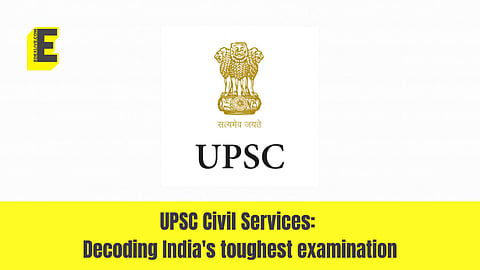

With nearly one million aspirants competing annually for just over a thousand positions, the Union Public Service Commission's Civil Services Examination (UPSC CSE) remains one of India's most formidable competitive challenges, with a success rate of merely 0.2 per cent.
The UPSC CSE serves as the gateway to prestigious role,s including the Indian Administrative Service (IAS), Indian Foreign Service (IFS), Indian Police Service (IPS), and various other Central Services.
In 2024, a total of 1,009 candidates were recommended for appointment to top Group A and B Central Services out of over a million applicants. Vacancies included 180 seats for IAS, 55 for IFS, and 147 for IPS, reflecting the intense competition.
Experts say clearing the exam demands more than just academic brilliance; it calls for discipline, strategic planning, and mental endurance.
"The competition is exceptionally fierce at the preliminary stage," explains Gopalakrishna V, Director of Brain Tree with three decades of industry experience. "Prelims is a jealous gatekeeper designed to bring down the number of candidates to a manageable number. Your response to 100 questions in two hours is all that matters."
The three-stage battle
The selection process comprises three rigorous stages: Preliminary Examination, Main Examination, and Personality Test (Interview). The final merit list incorporates performance across all three phases.
Ketan, UPSC mentor at UPSCPrep.com, advises an integrated approach: "Start by understanding the syllabus, which largely overlaps between Prelims and Mains, and build a strong foundation in subjects like History, Polity, Economy, Geography, and Environment without compartmentalising your preparation."
He recommends shifting to Prelims-specific preparation only 2-3 months before the exam, followed by Mains-specific preparation in the 3-3.5 months after Prelims. "Interview preparation can begin after Mains, as it focuses more on your DAF (Detailed Application Form)," he adds.
The topper's edge
What separates top rankers from those who merely clear the exam? Ketan offers insight: "Winners don't do different things; they do things differently. Most aspirants refer to the same set of study materials, but what sets toppers apart is their discipline and consistency."
He emphasises that successful candidates create structured plans and maintain focus on long-term goals. "Top-rankers don't overcomplicate things. Rather than chasing multiple sources, they rely on a few trusted resources and revise them multiple times. Their success lies in simplicity, consistency, and the ability to remain goal-oriented."
Gopalakrishna V concurs: "Every top ranker is a product of perseverance and focused work. A top ranker has the quality of 'attention to detail' which is what differentiates him from an average performer."
The optional subject dilemma
The optional subject contributes 500 out of 1750 marks in the Mains examination, often becoming the decisive factor in final rankings.
"Choose your optional based on your aptitude, extent to which it overlaps with General Studies, coaching facilities available, time taken to finish the syllabus in depth, and if it is regarded as a rewarding optional," advices Gopalakrishna V. He cautions against "choosing an optional for the only reason that toppers have taken it and changing optionals in successive attempts."
Ketan suggests evaluating options on four parameters: genuine interest, academic background, availability of good guidance and study material, and overlap with the GS syllabus. "Common mistakes include choosing a subject just because it's popular or said to be high-scoring, as scoring trends vary year to year and are not guaranteed."
Balancing static knowledge and current affairs
With current affairs playing an increasingly important role, aspirants must strategically balance their preparation.
"While reading the static part and making notes, leave enough space to jot down current affairs related to the topic," recommends Gopalakrishna V. "As you come across any current affairs related to the static part, note it next to the static part immediately. Make sure it is integrated in your notes."
Ketan emphasises starting with thorough coverage of the static syllabus: "Begin by thoroughly covering the static syllabus to build a strong conceptual foundation. Make concise, personalised notes for each subject to enable quick revision." He insists that "reading one newspaper daily is non-negotiable" and that the key is integrating static and dynamic content rather than treating them as separate domains.
The personality test
The final hurdle: the Personality Test, assesses candidates' suitability for public service.
"'Governmental Sense' is what UPSC looks for," explains Gopalakrishna V, "Are you sensitive to people's needs? Are you compassionate towards the underprivileged? Have you kept yourself aware of the events around you? Have you given it enough thought?" He highlights that personal integrity, willingness to appreciate contrasting viewpoints, and ability to synthesise opinions are crucial.
Ketan elaborates that the board seeks individuals who are "articulate, composed, and mature in handling complex, real-life scenarios." He advices candidates to deeply analyse their DAF, stay updated on current events, practice mock interviews, and improve communication skills.
Hope for self-learners
For aspirants preparing without coaching or from non-metropolitan areas, both experts offer encouragement.
"Resources are abundant wherever an aspirant is located. Technology has democratised access to resources," asserts Gopalakrishna V. He suggests referring to authentic resources and seeking professional advice, emphasising that "the right advice at the right time will surely result in success."
Ketan is equally optimistic: "In this digital age, place does not matter. All the resources required for clearing this exam are available online." He advocates building a disciplined self-study routine, following limited, reliable sources per subject, and revising regularly. "Consistency, clarity, and self-belief are far more important than location or coaching. What matters is how smartly and sincerely you use the resources at your disposal."
Despite its challenges, becoming an IAS officer through the UPSC CSE remains a dream for millions of young Indians. With strategic preparation and persistence, aspirants can navigate this demanding journey toward the nation's most prestigious services.
